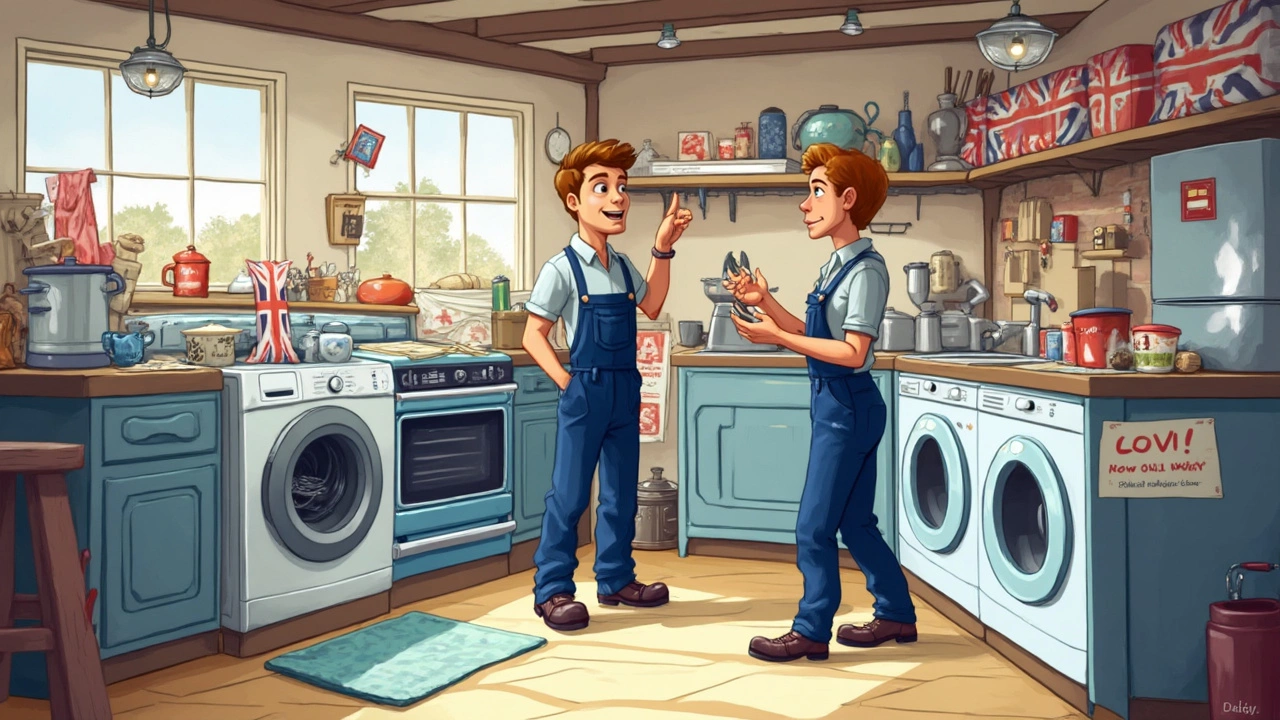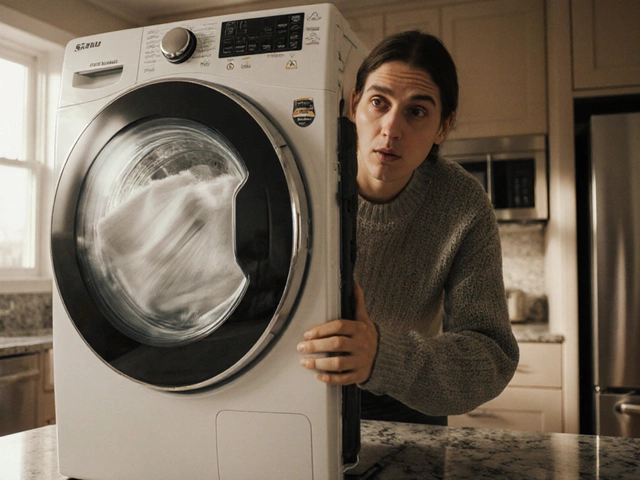Ever hear someone say "appliance for a job" and wonder if they're talking about a dishwasher or a job application? You're not alone. This phrase trips up people all the time, especially in the appliance service field. Sometimes ‘appliance’ means the actual equipment – like your dryer or fridge. Sometimes, though, folks mix it up with ‘application’ (you know, the paperwork for getting hired).
Here's the deal: in appliance service, 'appliance' almost always points to machines—washers, ovens, things you fix or install. But when you see someone mentioning 'appliance for a job' on a job board or a service call, it can get messy. I've seen techs show up ready to repair a stove, when the real issue was someone wanted to apply for a technician job!
If this confusion sounds familiar, you're in the right place. Getting clear can save time, prevent headaches, and make things run smoother—whether you need your appliance fixed, or you want to fix them for a living.
- How the Word 'Appliance' Gets Confusing
- When 'Appliance' Refers to Equipment
- When 'Appliance' Means Applying for a Job
- What Appliance Service Companies Look For in Candidates
- Tips for Applicants and Customers Alike
How the Word 'Appliance' Gets Confusing
If you’ve looked for help online or talked to someone in the appliance job meaning, you’ve probably noticed how people toss around the word 'appliance.' Sometimes it means a household machine, like a fridge or a microwave. Other times, people slip up and use it when they actually mean ‘application’—as in, wanting to apply for a job.
Let’s break down two typical scenarios. First, a service company advertises “Appliance Service Job Openings.” Does that mean jobs for fixing appliances, or jobs for handling equipment? Or is it just a grammar error, with ‘appliance’ in place of ‘application’?
This isn’t just a small thing. Bad wording in job posts or service requests can easily send people to the wrong place. Techs have shared stories in forums about arriving at customers’ homes with tool bags, only to find out the customer was actually looking to join the company—not get their washing machine fixed. Seems funny, but it wastes everybody’s time. Even job sites and HR platforms sometimes mess this up, especially when they use auto-fill or auto-correct features.
Here are a couple of classic mix-ups you might see:
- “Need help with an appliance for a job” (Does this mean you want to repair a machine, or apply for work?)
- “Submit your appliance for a job” (Do you bring your toaster, or fill out a form?)
Miscommunication leads to delays and lost business. According to a 2023 survey by Jobvite, 21% of job seekers abandoned job applications due to unclear job descriptions or confusing terms. Clear language keeps everyone on the same page.
| Term Used | What People Usually Mean | Common Confusion |
|---|---|---|
| Appliance | Fridge, oven, washer, dryer | Job application paperwork |
| Application | Job application paperwork | Some think it refers to machines |
So, next time you see someone post about an 'appliance for a job,' it’s worth asking what they really mean. Chances are, they just mixed up their words. A quick clarification can save a lot of hassle.
When 'Appliance' Refers to Equipment
In the appliance job meaning conversation, 'appliance' usually points to everyday machines you have at home or in the workplace. We're talking fridges, washers, dryers, stoves, dishwashers, and freezers. These are the machines that keep your food cold, your dishes clean, and your clothes fresh. In appliance service, technicians work hands-on with these items. The term ‘appliance’ just means any device that does a specific household job, powered by electricity or gas.
Here's what falls under 'appliance' in the service world:
- Kitchen gear: Refrigerators, ovens, cooktops, and microwaves
- Laundry machines: Washing machines and clothes dryers
- Cleaning helpers: Dishwashers and even garbage disposals
- Ice makers and wine coolers—yep, those count too
People call in appliance techs when something stops working. Maybe the fridge is leaking, or the dryer just won’t heat up—it’s the technician’s job to figure out the problem and fix it fast. Most appliances have labels with model numbers. Taking a picture of that and having it ready can save everyone a headache. If you ever make a service call, mentioning what specific appliance you need help with makes things ten times smoother for everyone involved.
The appliance service industry is big—over 80% of U.S. homes have at least five major appliances. That means plenty of repair visits every year, and a steady demand for skilled technicians who know their way around these machines.

When 'Appliance' Means Applying for a Job
Here’s where things really get mixed up: sometimes people use "appliance" when what they really mean is a job application. It’s surprisingly common to spot this typo online or in shop talk. For example, ads might say, "Fill out the appliance for a job today," which honestly makes things confusing for anyone new to the trade.
To be clear: if you're hoping to work as an appliance technician, you're filling out a job application—not an appliance. Companies need technicians who can fix, install, or maintain home machines, but they need you to apply the right way. When you’re job hunting, look for phrasing like "submit your application" instead of anything about appliances (unless you’re talking about a physical fridge or oven).
In the United States, the home appliance repair industry keeps growing. According to data from the U.S. Bureau of Labor Statistics, there were about 38,000 appliance repairers working in 2024, and demand is expected to stay steady as homes get filled with more gadgets. No surprise, repair shops receive a lot of applications. Check out this quick breakdown of typical applicant stats for appliance service jobs:
| Year | Average Applicants Per Opening | Entry-Level Hires (%) | Experienced Hires (%) |
|---|---|---|---|
| 2023 | 24 | 61 | 39 |
| 2024 | 27 | 59 | 41 |
If you’re filling out an application for an appliance repair job, here’s what the process usually looks like:
- You find a posting on a job board, company website, or through word of mouth.
- You fill out an online or paper application form, listing basic info and any relevant experience.
- If you qualify, you might get a call for an interview and, sometimes, a basic skills test.
- Once accepted, you’ll often get short training before heading out to real jobs.
Watch out for those job ads and forms with mix-ups. If you’re not sure, just ask: "Are you looking for someone to service an appliance or someone applying for the job?" It might save time for you and the person on the other end.
What Appliance Service Companies Look For in Candidates
If you’re thinking about getting into the appliance service game, you’re probably wondering what bosses really want. Let’s keep it real: they’re not just hunting for folks who know how to hold a screwdriver. Appliance service companies look for a mix of solid technical skills and the kind of attitude that makes customers ask for you by name.
First off, technical know-how is huge. You’ve got to be comfortable around both new and old appliances—fridges, washers, ovens, you name it. Most companies expect you’ll either have a certificate from a trade school or proof you’ve learned on the job somewhere else. If you know your way around electrical systems and can read a wiring diagram without sweating, you’re already ahead of a lot of folks. According to the U.S. Bureau of Labor Statistics, more than 55% of appliance repair techs have some sort of post-secondary certificate or training.
Beyond the toolbox stuff, employers pay close attention to your soft skills. Are you on time? Can you talk to people without sounding like a robot? Customer service matters way more than people think, because you’ll be in somebody’s home fixing their stuff. If you smell like last night’s takeout and mumble, it won’t matter how good you are with a wrench.
- Technical certifications (like from the Professional Service Association or a community college)
- Hands-on experience (apprenticeships, prior work, personal projects)
- Strong communication skills
- Problem-solving smarts
- A clean driving record (since a lot of jobs come with a company van)
Some places even run background checks and drug screenings—not exactly fun, but it’s standard now. If you’ve already got a good record, that box is checked.
| Requirement | % of Employers that Care |
|---|---|
| Technical Training | 82% |
| Customer Service Skills | 67% |
| Valid Driver’s License | 91% |
| Background Check | 58% |
| Drug Screening | 49% |
Here’s another thing: companies love when you can keep cool under pressure. Sometimes a job will take twice as long as you planned. Maybe the part you need is out of stock. Can you stay chill and improvise? That’s gold in this business.
So, if you want to get hired as an appliance job tech, brush up on your repair chops, work on your people skills, and come in ready to show you’re reliable. The rest usually follows if you’ve got those basics covered.

Tips for Applicants and Customers Alike
If you’re thinking about jumping into the appliance service world—either as a customer needing repairs or as someone wanting that technician gig—one thing’s true: clear communication saves everyone a ton of hassle. Let’s lay out what really helps both job seekers and people who just want their washer fixed ASAP.
First, if you’re an applicant, make sure your application spells out your experience working with specific appliance brands and types. Don’t just write "I fix appliances." Get into which ones—Samsung dryers, GE dishwashers, Whirlpool fridges. Companies love details because it shows you’re not guessing your way through repairs. If you’ve got a certification (like EPA for refrigerants), put that up front. According to the U.S. Bureau of Labor Statistics, certified appliance techs earn about 10-15% more than non-certified beginners.
For customers, be as specific as possible about the issue. Saying "my fridge is loud" isn’t nearly as helpful as "my 2017 GE French door fridge makes a buzzing sound from the back when the compressor kicks on." The more info you give, the faster you get the right person with the right parts. About 70% of first-time-fix rates (that’s when a tech gets it done on the first visit) depend on getting these details up front—hard truth.
- Applicants: Double-check your contact info. People miss out on jobs because of a wrong number or email.
- Customers: Snap a pic of the appliance’s model number and serial—most techs ask for it anyway.
- Applicants: Expect a skills test or a trial repair in the interview process. Prepping helps you look sharp.
- Customers: If it’s under warranty, mention it right away. Different fixes and paperwork kick in for warranty jobs.
Here’s a quick look at how good info can make or break the process:
| Situation | Right Info Given | Common Result |
|---|---|---|
| Job Applicant lists exact appliances & certifications | Yes | More interview offers |
| Customer provides detailed appliance issue and model | Yes | Higher first-time fix rates |
| Applicant forgets contact info | No | No call-back |
| Customer forgets to mention warranty | No | Delay in service |
If you’re looking for a appliance job meaning or calling for help, remember: specifics and preparation are everything. Saves everyone time and money, and gets real results faster.




